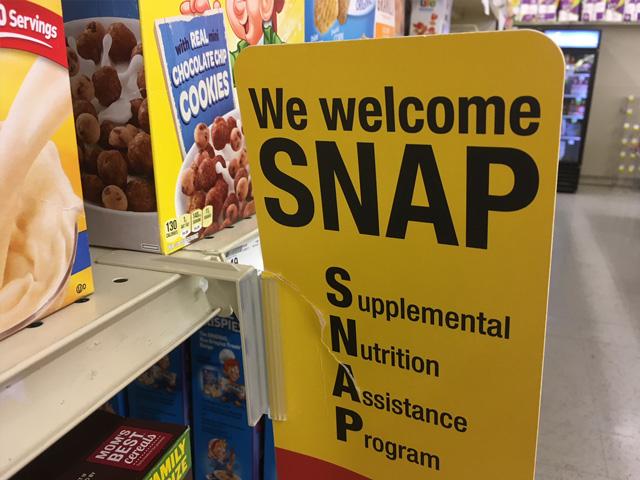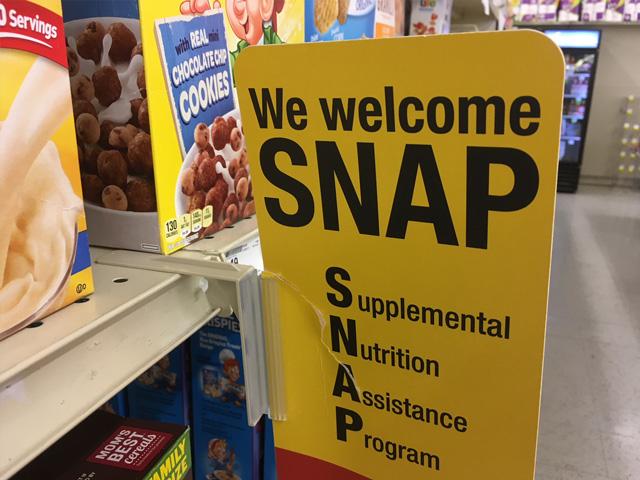Ag Policy Blog
Battle Lines Being Drawn Over SNAP Cuts in Reconciliation Bill
WASHINGTON (DTN) - The Food Research & Action Center held a rally Tuesday on Capitol Hill as the group's members also lobbied individual lawmakers against cuts to the Supplemental Nutrition Assistance Program (SNAP) and other nutrition programs in the budget reconciliation process.
Sen. Amy Klobuchar, D-Minn., ranking member on the Senate Agriculture Committee, Rep. Alma Adams, D-N.C., and other legislators, faith and union leaders spoke at the Tuesday event.
Also, House Agriculture Committee Ranking Member Angie Craig, D-Minn., followed up on Wednesday, holding a separate press conference with other House Democrats and a pair of farmers. Carah Ronan, a fifth-generation farmer in Montana, said at the event that SNAP is important for veterans, single mothers, the elderly and children. SNAP recipients from West Virginia and South Carolina also spoke.
Yolanda Gordon, South Carolina veteran and mother, explained. "While serving in the military, my small family relied on SNAP to put food on the table."
Craig noted at the press conference that the average daily SNAP benefit comes out to about $6 a day. "We should be working to make these programs better, not taking food assistance from seniors living on fixed incomes when they're already struggling with higher prices," Craig said.
Meanwhile, Republican members of the House Agriculture Committee met to discuss how to follow the House Budget Committee instruction to cut $230 billion from programs under the committee's jurisdiction. Most, if not all, of that cut is expected to come from SNAP.
House Agriculture Committee Chairman Glenn Thompson, R-Pa., has said he is unwilling to cut current benefits.
The committee is expected to hold a markup next week on cuts for the reconciliation bill. The cuts to SNAP will help bolster efforts to extend and expand the 2017 tax cuts.
P[L1] D[0x0] M[300x250] OOP[F] ADUNIT[] T[]
Politico reported there is a rift among moderate Republicans and others in competitive districts who oppose pressing aggressively for SNAP cuts. Other Republicans, however, also don't think the cuts go far enough.
The budget measure is expected to raise work requirements for SNAP beneficiaries and to forbid future noninflationary increases through rewrites of the Thrifty Food Plan that is used to determine benefit levels. But that still doesn't reduce the spending level enough, and passing along part of the cost of benefits to the states is under consideration. Red state governors are likely to object to being expected to make up for the cut at the federal level.
The Wall Street Journal's editorial on Wednesday also addressed SNAP cuts, citing the "need to fix the dysfunctional federal food assistance program." The WSJ highlighted that only 16% of "able-bodied adults without dependents" work. The editorial said states exploit waivers from the federal government. The WSJ also states more than 10% of SNAP payments are improper as well.
According to congressional testimony, able-bodied adults without benefits, known as ABAWDs, make up about 6% of all SNAP recipients, or roughly 2.5 million people. In general, ABAWDs are limited to three months of benefits, unless their state receives a waiver based on employment issues.
In April, an economist at Northwestern University, testified before the House Agriculture Committee, highlighting that about half of ABAWDs are women, and over one-third of those woman report having a disability that affects their ability to work, though not qualifying them as disabled under SNAP criteria.
Thompson last week pointed out that several governors are asking USDA to grant waivers to allow them to forbid SNAP beneficiaries from buying sugar-sweetened beverages and other foods. Thompson said that if the governors propose to manage the program they should also agree to fund it. The states manage SNAP, and there have also been proposals to require states with high payment error rates to pay more of the benefits than other states.
A Thompson spokesman did not respond to a request for comment, but in the past has pointed out that the House budget bill is not the final action Congress will take on reconciliation. The Senate budget instruction is to cut $1 billion from programs under the jurisdiction of the Senate Agriculture Committee, and the two chambers will have to reach agreement on the final bill.
In the Senate, Sen. Mike Lee, R-Utah, also wants states to pick up a bigger share of SNAP costs. He's introduced a bill that would require states to start paying 5% of SNAP costs and incrementally increase those state payments until they reach 50%. Lee, in a news release, stated that the bill would close loopholes that have led to a rapid expansion of the program.
"SNAP was designed to provide temporary relief to vulnerable people facing difficult times, not a permanent subsidy for able-bodied adults," Lee stated. "Work requirements are widely supported by the American public, save taxpayer dollars, and will strengthen the program for families who really need it. Our legislation tackles fraud and abuse while promoting self-sufficiency, which should be the goal of all such programs."
Jerry Hagstrom can be reached at jhagstrom@nationaljournal.com
Follow him on social platform X @hagstromreport
Chris Clayton can be reached at Chris.Clayton@dtn.com
Follow him on social platform X @ChrisClaytonDTN
(c) Copyright 2025 DTN, LLC. All rights reserved.






Comments
To comment, please Log In or Join our Community .